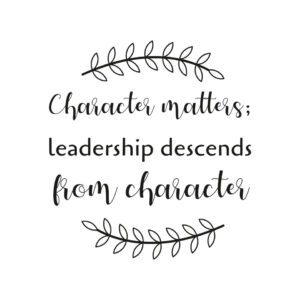filter posts:
Date
Author
Developing a Gospel Culture
 When the brothers are brought before Joseph to face the music for their guilt in stealing his silver cup, Judah emerged as the group’s spokesman. What gave him the standing to take on this role? He had broken faith with his family by marrying a Canaanite. He had raised two sons who were so wicked that the Lord put them to death. He had treated his daughter-in-law as a prostitute. He had hatched the plan to sell his own brother as a slave. But the Judah we see in this appeal to Joseph is a different man. A man who has been changed by God.
When the brothers are brought before Joseph to face the music for their guilt in stealing his silver cup, Judah emerged as the group’s spokesman. What gave him the standing to take on this role? He had broken faith with his family by marrying a Canaanite. He had raised two sons who were so wicked that the Lord put them to death. He had treated his daughter-in-law as a prostitute. He had hatched the plan to sell his own brother as a slave. But the Judah we see in this appeal to Joseph is a different man. A man who has been changed by God.
He tells Joseph the story of a father who has lost a son, a son that was torn to pieces and for whom he still grieves. He tells him the brother of that lost son, from the same mother, is this younger son, the one they brought back with them to Egypt, and he is greatly loved by their father. So much so that he had refused to let them take him to Egypt, for fear that he too would be killed. His life, my father’s life, Judah says to Joseph, is bound up in this son’s life. If we leave that boy here as your servant, and we return without him, sir, we will “bring down the gray hairs…of our father with sorrow to Sheol.” Judah makes an appeal to the heart of this man who has all power in Egypt, not knowing that the father he is talking about who may die in grief if Benjamin does not return, is also father to the man listening to the appeal. The father Joseph has not seen in 22 years.
Then Judah goes much further than making an emotional appeal for Benjamin’s life. He offers his life in Benjamin’s place. He offers himself as a sacrifice. Allen Ross writes, “The passage teaches that, in order for brothers (and sisters) to live together in unity, they must have self-sacrificing love for one another.” Have the brothers had this before? No, they failed miserably. They are being tested to see if they have that love for one another now, love that is willing to sacrifice for the well-being of others. But notice that God is also leading them to a place where they can have their past sins uncovered. So they can be delivered from the deceit they have lived with for 22 years, and so they can come to realize how much they will need to love one another to prevent such evil in the family of faith from happening again.
Don’t miss the Gospel in this. Judah offered himself, and he was innocent in this case, to take the place of the one who appeared to be guilty. And he did so for the love of his father. Jesus said to his disciples, “Greater love has no one than this, that someone lay down his life for his friends.” Jesus went on to demonstrate that for us, and he calls us to do the same. Claus Westermann wrote, “There is a path that leads from the Joseph story right up to the very threshold of community; the healing of a breach is possible only when there is one who is ready to take the suffering upon oneself.”
I listened to a podcast last week called “You’re not Crazy!” Ray Ortlund and Sam Alberry talk about churches that have gospel doctrine but are lacking gospel culture. Their question was, if we have orthodoxy of doctrine, and that’s critical, do we also have orthodoxy of community? In other words, we know what we believe and why we believe it and are absolutely committed to living in a way that corresponds to that doctrine. We are rightly captivated by truth. But, what if we have a blind spot to what that truth is meant to produce in me and through me in the lives of other people? Do we have a transparency and a humility about who we are and the struggles we have and the need we have to walk with others through that and not live as though we have it all sewed up? That attitude of thinking, that we “have it all together,” undermines the gospel culture that we must have if the church is to be healthy and to be attractive to the world around us. We see that gospel culture beginning to emerge with the brothers in Genesis, especially with Judah.
Do we see that same culture developing in our church?
April 24, 2023
Character Matters
 Aristotle said years ago that a person’s credibility as a speaker is a product of his character and his competence. Someone said years later, “Your character is who you are in the dark.” When no one is looking, the choices you make reveal your true character. Your competence is your ability. When Aristotle’s students asked the famous philosopher which of the two was most important, he said, “If you can only have one, have character.” He explained that people will be persuaded much more readily by an incompetent speaker who is an honest man than by a skillful orator who is a liar. Given the landscape of politics and business and even church life that we see today, would the Greek great say the same?
Aristotle said years ago that a person’s credibility as a speaker is a product of his character and his competence. Someone said years later, “Your character is who you are in the dark.” When no one is looking, the choices you make reveal your true character. Your competence is your ability. When Aristotle’s students asked the famous philosopher which of the two was most important, he said, “If you can only have one, have character.” He explained that people will be persuaded much more readily by an incompetent speaker who is an honest man than by a skillful orator who is a liar. Given the landscape of politics and business and even church life that we see today, would the Greek great say the same?
Probably since the Watergate scandal in the early 1970’s, when Richard Nixon was caught in a cover-up that eventually ended his presidency, the nation has repeatedly asked the question, “Is there a connection between character and performance?” And we ask, “Should it matter how leaders carry on in their ‘personal lives’? Kent Hughes says the comparison is often made between an airline pilot and a head of state. “Who would you rather have at the control of the plane? A competent pilot with moral weakness or an incompetent pilot with moral character?” The problem with comparing a pilot to a president is obvious, isn’t it? Flying a plane is not an intrinsically moral task. But piloting a nation is. That’s why the Bible says, “When the righteous are in authority, the people rejoice, but when a wicked man rules, the people groan.” If we do even a cursory examination of why various kings of Israel failed, we find it was always because of matters of the heart, who they were, and not matters of intellect or ability. Their character was tried in the balance and found wanting, not their competence. Leading a nation is a moral task. The Bible makes that clear. So is leading a church. And leading a family. Even leading a business.
Paul compares the church to a ‘great house’ in his second letter to Timothy, and in every great house, Paul writes, are vessels of honor and dishonor. Timothy would have known immediately what Paul was talking about. I think we do, too. In our basement, for example, we have dog bowls that Buddy and Ginger ate from before they went to their great reward. We have never once used those bowls to serve guests their soup. We don’t bring them up from the basement and serve our grandsons oatmeal in them when they come over. No, they are dog bowls. We also have fine dinnerware that we pull out for special occasions. We never once let Buddy or Ginger use those. There is a clear separation in the big house between vessels of honor and vessels of dishonor. It is the same in the church. So, what does it take to become a vessel of honor in the church? Paul says it plainly: “If anyone cleanses himself…” The offer is to anyone. Tax collectors like Matthew. Sheepherders like Amos. Fishermen like Peter and John. The offer has a condition: the one who is most useful to the Master is a clean vessel. Before you run get the soap, the kind of ‘clean’ God is talking about here is of the heart, and only he can do that. And he does, with everyone who comes to him broken and repentant.
Is character connected to performance? Inextricably. It matters in every arena of life.
April 17, 2023
The Perfect Gift
 He who did not spare his own Son but gave him up for us all… Romans 8:32
He who did not spare his own Son but gave him up for us all… Romans 8:32
Who is He in this statement? God! What did he not do? God did not spare his own Son. What did he do? He gave him up for us all. God sent Jesus to the cross, what Martyn Lloyd-Jones called, “The most amazing spectacle the world has ever seen.” The cross was where “the immortal dies,” as Charles Wesley wrote in his hymn, “And Can it Be?” Isaac Watts wrote in his hymn the cross is where “Sorrow and love flow mingled down.” The writer of Hebrews wrote that Jesus “for the joy that was set before him endured the cross, despising the shame.” John Stott wrote, “What dominated His mind was not the living, but the giving of His life.”
Jesus’ death on the cross changed the world. In his book, The Cross of Christ, F. J. Huegel writes about the days of rebellion in China in 1900, when a group arose in the country with the sole purpose of driving all the foreigners out of China, particularly missionaries from the west. This group captured a mission school, blocked all the gates but one, placed a cross on the ground at that gate, and sent in word that anyone who trampled on that cross could go free, but that anyone who stepped around it would be killed. The first seven children trampled on the cross and were allowed to go free. The eighth, a girl, knelt before the cross and was shot. All the rest in a line of a hundred students followed her example.” Jesus’ death on the cross changed the world.
Listen to Paul’s argument. He who did not spare his own Son but gave him up for us all, how will he not also with him graciously give us all things? In logical terms, this is an argument from the greater to the lesser. From the harder to the easier. He gave up his Son. For us. How will God not give us much more that requires much less?
Several months ago, a number of us gathered outside at 8am for a first work day on the landscaping around the church building. Remember? We worked for 8 hours breaking up the soil around the flower beds, digging up roots, loading up the debris and dirt in wheelbarrows and hauling it to the woods. It was back breaking work. I remember watching John take a pickaxe to a crape myrtle root, hitting it with blow after blow, cutting through it finally. What if at church the next day, one who had labored with John asked him bring a cup of water from the kitchen? Would John do it? Oh, I have no doubt. John is a man who serves. But also, getting a cup of water from the kitchen is a whole lot easier than swinging a pickaxe, hauling a wheelbarrow, or riding a two-man auger on rock-hard soil, as some workers did all day. It’s an argument from the greater to the lesser.
Joni Eareckson Tada, paralyzed in a diving accident more than 50 years ago, recently said: “Don’t assume that all I ever do is dream about springing out of this wheelchair, jumping up, dancing, kicking, doing aerobics. No I’m looking forward to heaven because of a new heart, a heart free of sin, sorrow, selfishness. That beats having a new body any day.” Do you hear that? It’s an argument from the greater to the lesser! Her body will be healed but only because of the greater miracle: her heart will be made perfect, free from sin forever. Because of what God did.
What did God do? He who did not spare his own Son but gave him up for us all. That’s the hard thing. The greater thing. The greatest and hardest work ever done in all the universe. To understand this work, this sacrifice, we have to give human terms to it. I know God is God and nothing is impossible with God, but that doesn’t mean that not sparing his own Son was easy. No! It was infinitely hard for an infinite God to sacrifice his only Son. Why did God do it? Because of your sin and mine. Because of his wrath against your sin and mine. Because of his desire to have your sin and mine, and his wrath against your sin and mine satisfied, so that you and I could be saved, so that you and I could be forever in his presence, happy and holy and without sin. Because there is nothing you or I can do to satisfy God’s wrath against our sin. He had to do it for us.
He gave the perfect gift. Paul adds, “how will he not also with him graciously give us all things?” If God did the hard thing for us, will he not also do the easy, small, even insignificant things for us as well?
April 9, 2023
Live quietly, mind your own business, and work hard
 A study in the book of Ruth is so many things, but on one level it is a picture of diligence and initiative. When Ruth arrived in Bethlehem, she was an alien in a foreign land, and a widow. Her only connection in the nation of Israel, her new home, was Naomi, who was also a widow. That did not deter Ruth in the least from taking the initiative to go out and glean in the fields, so that she and her mother-in-law could eat. It was her diligence that caught the eye of the foreman of the field she “happened upon,” and that work ethic was reported to Boaz, the landowner: “She has continued (to work) from early morning until now,” the foreman said, “except for a short rest.”
A study in the book of Ruth is so many things, but on one level it is a picture of diligence and initiative. When Ruth arrived in Bethlehem, she was an alien in a foreign land, and a widow. Her only connection in the nation of Israel, her new home, was Naomi, who was also a widow. That did not deter Ruth in the least from taking the initiative to go out and glean in the fields, so that she and her mother-in-law could eat. It was her diligence that caught the eye of the foreman of the field she “happened upon,” and that work ethic was reported to Boaz, the landowner: “She has continued (to work) from early morning until now,” the foreman said, “except for a short rest.”
A companion piece to this encouragement to work hard can be found in the New Testament in the book of 1 Thessalonians. Paul encourages the church to do three things. First, live quietly. Why not forget the foolish notion that to be useful you have to be noticed? Second, mind your own business. If we try to mind ours and others, we make messes of both. Third, work with your hands. The result is a good testimony with outsiders.
I remember it like it was yesterday. I had a summer job working in a factory at RJR Tobacco Company in my hometown. There were other college kids like me working, and one stands out in my memory, but not because of his diligence. His motto must have been, “Never stand when you can sit, and never sit when you can lie down.” His job was to paint the guardrails in the factory, the ones that separated the floor where the forklifts roamed freely, and the walkways around the perimeter. The rails were probably eight inches in diameter, and metal. He painted them yellow. With a brush. Lying down. Moving. His. Arm. Very. Slowly.
“I thought the boy was dead for a while there.” That was the comment of one seasoned veteran of Factory 51. I’ll call him Salty. He spit tobacco juice into the empty Pepsi can he was holding and shook his head with disgust. “I tell you one thing,” Salty continued, as the others in the break room nodded, “If that was my boy, I would wear him out. He wouldn’t be too old to spank in my house, I can tell you right now. That boy is pathetic.”
Just as an aside, you may have figured out that this salty character from my past was not known for his timidity. His motto may have been, “Often wrong, but never in doubt.” One day another man was complaining about his dog to the rest of us in the break room. “You want to know how crazy my dog is?” he asked. “When people ring the doorbell, he doesn’t bark. When they come inside and sit down to visit, he doesn’t make a peep or do a thing. But when they get up to leave, that’s when he tries to bite them!” Most of us just laughed and shook our heads at the idea. Not Salty. He squinted at the dog owner and said with every ounce of sincerity, “You need to get rid of that dog.” Or actually, “that dawg.”
Well, the point is that whether you agree with Salty’s child training or his dog whispering, he was greatly offended by the college boy’s approach to work. If the college boy was a Christian, his testimony among outsiders was a lousy one.
It’s good advice: live quietly, mind your own business, and work hard.
April 2, 2023
